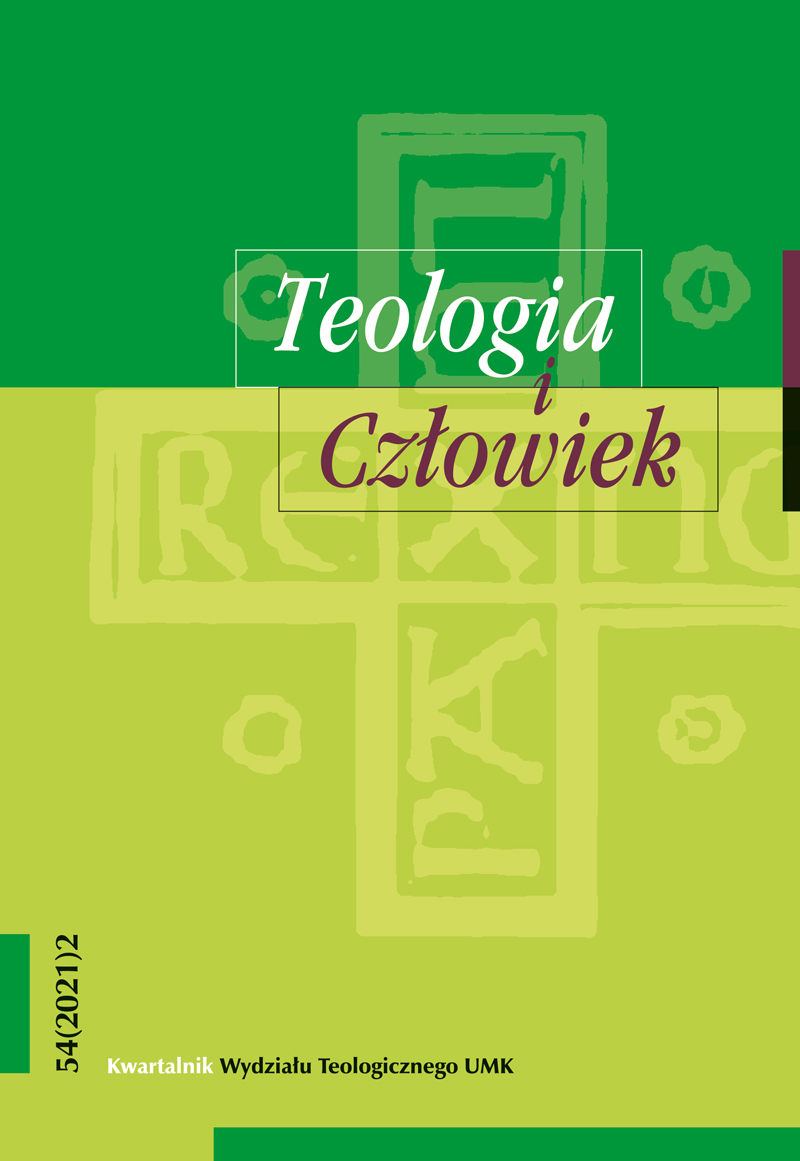De Pulchra, pax omnium rerum tranquillitas ordinis. Przyczynki do estetyki św. Augustyna
DOI:
https://doi.org/10.12775/TiCz.2021.011Keywords
St. Augustine, being, aesthetics, human, idea, soulAbstract
St. Augustine theory maintains the objectivity of beauty alongside other transcendental properties of being. Unity, equality, number, proportion, and order are the main elements in Augustine’s theory of beauty. Acquiring the knowledge originating in beauty leads to the perfection of life, thus bringing us closer to God. St. Augustine taught that unity is the form of all beauty. In a sense, God’s beauty emanates out to natural things through His act of creation. All created things are realizations of divine ideas and bear a trace of similarity to God. The soul, which is open to these ideas, is the link that joins with the divine ideas. While building an objectivist theory, Augustine drew from considerations of geometry, astronomy and mathematics. Number, for Augustine, measures rhythm and everything is beautiful that is in due order. Augustine believes in a hierarchy of beautiful things, based on how much form they possess or lack, for example mathematical truths cannot be determined by convention. Augustine’s multifaceted approach to the idea of God was particularly valuable for later ethical thought.References
Berkeley, George, Alkifron, przeł., wstępem i przypisami opatrzył Mikołaj Olszewski, Biblioteka Europejska, Wydawnictwo Marek Derewiecki, Antyk 2008.
Biblia Tysiąclecia. Poznań: Wydawnictwo Pallottinum, 2012.
Brudz, Józef, Dowód św. Augustyna na istnienie Boga z prawd wiecznych w: Alma Mater Tarnoviensis: księga pamiątkowa z okazji 150 rocznicy założenia Instytutu Teologicznego i Seminarium Duchownego w Tarnowie (1821–1971), red. Piotr Bednarczyk, Franciszek Gawlik, Tarnów 1972, s. 103–115.
Copleston, Frederick, Historia filozofii, t. II: Od Augustyna do Szkota, przeł. Sylwester Zalewski, Warszawa: Inst. Wydawniczy PAX, 2000.
Gilson, Étienne, Wprowadzenie do nauki świętego Augustyna, tłum. Zygmunt Jakimiak, Warszawa: Instytut Wydawniczy PAX, 1953.
Grabmann, Martin, Des hl. Augustinus, Quaestio de ideis, Mittelalterliches Geistesleben, Bd. II, München 1936.
Jan Paweł II, List Ojca świętego Jana Pawła II do Artystów, Watykan: Drukarnia Watykańska, 1999.
Kälin, Bernard, Die Erkenntnislehre des hl. Augustinus, Sarnen 1921.
Karpowicz–Zbińkowska, Antonina, Harmonia Bożego dzieła stwórczego w dialogach filozoficznych św. Augustyna, “Studia Theologica Varsaviensia” 44/2, (2006), s. 55–85.
Manoussakis, John P., Theophany and Indication, Reconciling Augustinian and Palamite Aesthetics, “Modern Theology” 26/1 (2009), s. 76–89.
Mausbach, Joseph, Die Ethik des heiligen Augustinus, Freiburg 1929.
O’Collins, Gerald; Edward G. Farrugia, Leksykon pojęć teologicznych i kościelnych z indeksem angielsko-polskim, przekł. Jan Ożóg, Barbara Żak, Kraków: wyd. WAM, 2002.
Puzio, Jan, Teoria poznania zmysłowego u św. Augustyna, Lublin 1947.
Św. Augustyn, Księga osiemdziesięciu trzech kwestii, przeł., komentarzami opatrzyła Ida Radziejowska, Kęty: Wydawnictwo Marek Derewecki, 2012.
Św. Augustyn, O muzyce w: Dialogi filozoficzne, t. 4, tłum. Danuta Turkowska, Warszawa: PAX, 1953, s. 5–79.
Św. Augustyn, O porządku w: Św. Augustyn, Dialogi filozoficzne t. 1, tłum. Józef Modrzejewski, Warszawa: PAX, 1953, s. 144–226.
Św. Augustyn, O Trójcy Świętej, tłum. Maria Stokowska, wprow. Józef Tischner; posł. i przypisy Jan Maria Szymusiak, Kraków: Wydawnictwo Znak, 1996.
Św. Augustyn, O wierze prawdziwej w: Dialogi filozoficzne, t. 4, tłum. Jerzy Ptaszyński, Warszawa: PAX, 1953, s. 80–159.
Św. Augustyn, O wolnej woli w: Dialogi filozoficzne, t. 3, tłum. Anna Trombala, Warszawa: PAX, 1953, s. 71–235.
Św. Augustyn, Państwo Boże, przeł. Władysław Kubicki, wstęp Jacek Salij, Kęty: Wydawnictwo Antyk – Marek Derewiecki, 2002.
Św. Augustyn, Wyznania, przeł., opatrzył posłowiem i kalendarium Zygmunt Kubiak, Warszawa: Instytut Wydawniczy PAX, 1987.
Tatarkiewicz, Władysław, Historia estetyki, Estetyka średniowieczna, Warszawa: Wydawnictwo Arkady, 1989.
Zabielski, Stanisław, Święty Augustyn i fenomenologia, Historycznofilozoficzna analiza stanowiska Jana Hessena w kwestii intuicji augustyńskiej, Lublin: Wydawnictwo Uniwersytetu Marii Curie-Skłodowskiej, 2003.
Downloads
Published
How to Cite
Issue
Section
License
Copyright (c) 2021 Theology and Man

This work is licensed under a Creative Commons Attribution-NoDerivatives 4.0 International License.
CC BY ND 4.0. The Creator/Contributor is the Licensor, who grants the Licensee a non-exclusive license to use the Work on the fields indicated in the License Agreement.
- The Licensor grants the Licensee a non-exclusive license to use the Work/related rights item specified in § 1 within the following fields: a) recording of Work/related rights item; b) reproduction (multiplication) of Work/related rights item in print and digital technology (e-book, audiobook); c) placing the copies of the multiplied Work/related rights item on the market; d) entering the Work/related rights item to computer memory; e) distribution of the work in electronic version in the open access form on the basis of Creative Commons license (CC BY-ND 3.0) via the digital platform of the Nicolaus Copernicus University Press and file repository of the Nicolaus Copernicus University.
- Usage of the recorded Work by the Licensee within the above fields is not restricted by time, numbers or territory.
- The Licensor grants the license for the Work/related rights item to the Licensee free of charge and for an unspecified period of time.
FULL TEXT License Agreement
Stats
Number of views and downloads: 948
Number of citations: 0



